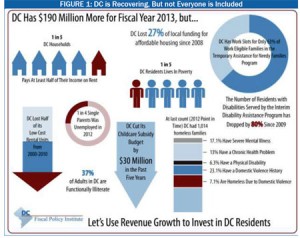The Snowquester will not stop the District’s Dime! We hope all our readers are staying safe today.
The financial news coming from the District shows that DC is climbing out of the hole left by the recession, even with the recent sequestration. DC’s revenue collections are back to pre-recession levels, the city had a $240 million surplus in 2011 and a $417 million surplus in 2012, and thousands have made DC their new home.
Yet for many residents, their circumstances have not recovered from the recession, a topic discussed at a forum yesterday sponsored by the Fair Budget Coalition. Poverty and unemployment remain high, and many programs that support residents in need were cut in recent years to help balance budgets. With DC’s finances recovering, it is time to begin to re-invest in programs that help ensure all residents can succeed.
Here are some trends highlighted at the forum:
- Nearly one third of DC’s children live in poverty, a sharp increase since 2007.
- The number of homeless families has nearly doubled since 2008.
- One in four single parents is unemployed despite looking for work, a rate that doubled in the recession. Unemployment also remains far higher than before the recession for DC residents without a postsecondary degree and low-wage workers.
Amidst these growing challenges, several programs aimed at helping residents are strapped.
- Funding for TANF work programs can serve only 63 percent of time-limited families. DCFPI applauds Mayor Gray for taking steps to delay the TANF benefit cuts, but we also encourage the Mayor and Council to ensure every parent is able to take advantage of new TANF services.
- DC’s childcare program has seen its subsidy budget cut by $30 million over the last five years.
- The number of residents with disabilities getting assistance from the Interim Disability Assistance program has dropped 80 percent since 2009.
With a $190 million surplus in FY 2013, it is time to use some of DC’s revenue growth to help residents who are still struggling in wake of the recession. Mayor Gray has already pledged $100 million for affordable housing ‘ an area that has seen funding reduced by 27 percent since 2008 ‘ and DCFPI encourages the Mayor and Council to see how the increased prosperity in DC can continue to be re-invested in programs that help ensure all residents succeed.
To print a copy of today’s blog, click here.

